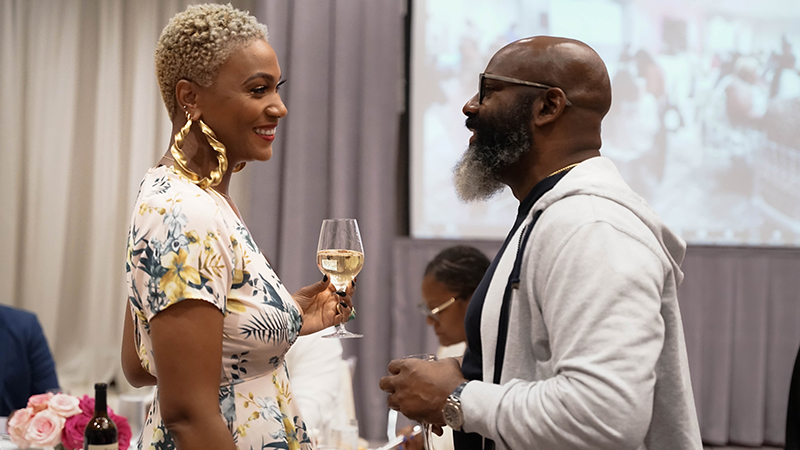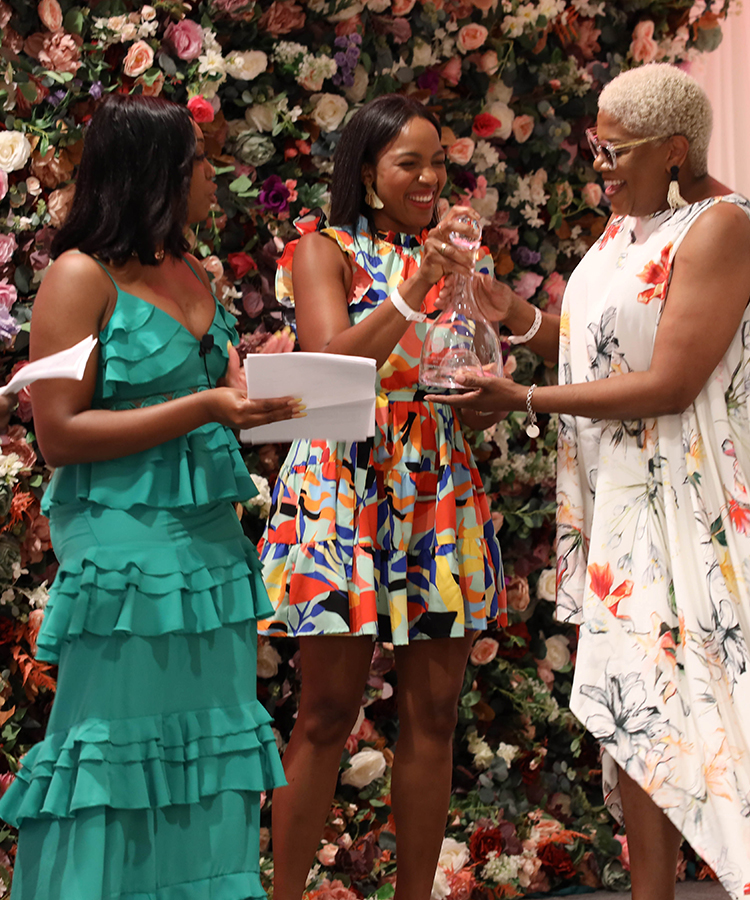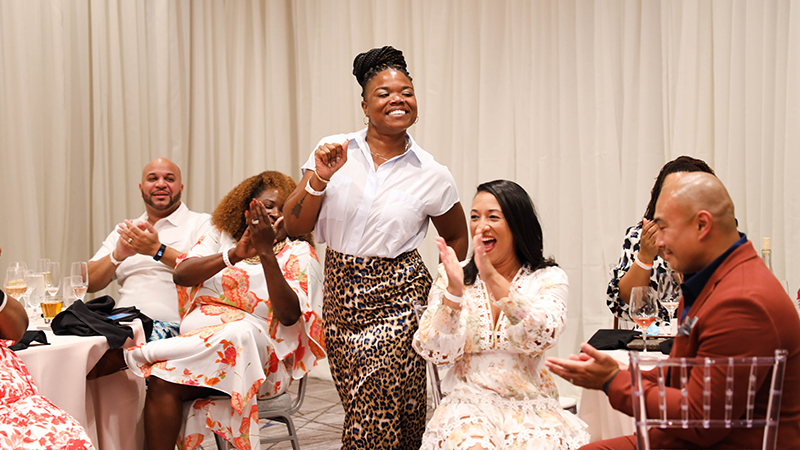
Tahiirah Habibi fell in love with wine while working at a hotel bar. Once she understood just how passionate she was about it, she worked for it – hard. She was a hostess during the day, but took wine classes at night, studying diligently with her sights set on becoming the first Black woman master sommelier. She honed her craft at the esteemed Michael’s Genuine and the St. Regis Bal Harbour Resort.
Later, her goals shifted to creating spaces of inclusion for people of color in the industry and to making lasting impacts that would change the wine landscape. Now, she’s the Founder/CEO of The Hue Society, a James Beard Awards Committee member, and has been featured in Wine Spectator, Vogue, Wine Enthusiast, Travel Noir, and more. But her goal for creating inclusive spaces around wine came from isolating personal experiences in the industry.
“Every time I looked around me, I was being whitewashed,” she recalls.
As a Black woman, Habibi has a unique insight compared to the majority of white and male leaders in the wine industry. And after all of her experience, including a stellar track record and making Wine Enthusiast’s 40 Under 40 Tastemaker list of 2020, she understood that this whitewashing was not just a part of being a sommelier, but a symptom of deeper issues long-ingrained into the wine industry as a whole.
Whitewashing, originally used to describe when white actors are cast to play non-white roles, also describes the expectation of whiteness in “professional” atmospheres. For example, protective Black hairstyles like locs, twists, or braids are mythologized as being “unprofessional” in many schools or workplaces, and this pressures people of color into changing their appearance and personality in order to assimilate into a primarily white environment.
In order to “even get to a place of basic human respect,” Habibi says she was expected to look and sound a certain way. She felt the pressure of having to turn into someone else, to erase parts of her identity in order to fit what the wine industry wanted her to be.
“I wanted to create a space people could call home and have some mental safety in,” Habibi says. In 2017, The Hue Society was born.
A New Kind of Wine Fest

A community-based organization, The Hue Society focuses on giving Black, Brown, and Indigenous consumers and brands access to wine resources, education, and experiences. The organization’s core values include dismantling racism through joy, reimagining the wine space, creating equity, and providing wine enthusiasts of color the tools they need to succeed.
The Hue Society’s signature event is the annual Wine & Culture Fest held in Atlanta, Georgia. It’s a festival full of tastings, interactive educational sessions, and social events that bring together industry veterans and wine newcomers alike. This year, the festival will take place from August 11-14, creating a space where attendees are encouraged to be themselves and navigate the wine industry in a new way – without the effort it takes to code-switch or the anxiety involved in conforming to a predominantly white environment.
The end of the festival is celebrated with the Roses and Rosé Awards Brunch, which honors diverse wine industry trailblazers. According to Habibi, the awards brunch is always emotional: “Everybody cries every time, we deserve to be celebrated this way by our peers.”
Last year’s event honored wine director and consultant Tonya Pitts, winemaker Iris Rideau, and Brown Estate, the first and only Black-owned estate winery in Napa Valley. Years prior have honored sommelier André Hueston Mack, Vision Cellars owners Mac and Lil McDonald, McBride Sisters, and more. By uplifting members of the wine industry who have been largely overlooked, The Hue Society helps set the precedent for the industry as a whole.
That’s what makes the event so important. Oftentimes, it is not enough for an industry to simply be “diverse” for the sake of diversity. Those perspectives deserve to be celebrated and honored, especially when Black, Brown, and Indigenous sommeliers and brands are still being left out of wine awards.
“Yes, it is Black-centered and focused on cultural perspectives, but the support is always diverse, and sometimes non-Black people win awards too,” Habibi says. “I think it just reimages what the wine space, particularly these awards, could or should look like.”
The event is one of Habibi’s all-time favorites. This year, the menu features soul brunch food and rosé pairings in a family-style, free-flowing dining experience. According to Habibi, there are some surprise wines to show off as well. And while the rosé may be the star of the brunch, the flowers are just as important.
The Significance of the Rose
“Roses and Rosé” flowed well as a name, Habibi explains, but the roses have significance beyond their beauty.
“In our culture, there are lots of references to a rose growing out of concrete,” Habibi says, “or the famous Aretha Franklin song ‘A Rose is Still a Rose’. It’s also about giving people their flowers while they are here to enjoy them.” Last year’s Wine & Culture Fest came after a difficult year of quarantining and civil unrest, but the community came together once again. People flew in from all over the country: “I was amazed by that,” Habibi says. “And so grateful.”
“Last year was when we really honed in on our community legends,” Habibi continues. “I saw from those awards how many other people in our community, particularly the legends we honored, got further recognition in other places. I think it did its job.”
Recognizing these trailblazers and uplifting members of the wine community the way The Hue Society does not only fulfills Habibi’s dream of inciting lasting change in the industry but shifts the way people view wine as a hobby and career. And when you’re working hard to change an industry for the better, you’ve got to play hard, too. The awards brunch is a moment of celebration and joy that recognizes the work and progress the community makes.
On what the future of the wine industry looks like to her, Habibi says: “I see the future becoming more Black women-led, honestly. I see us stepping into this space and owning it, and I absolutely love that. I think it’s beautiful and I can’t wait to see what that brings.”
This article is sponsored by The Hue Society.

